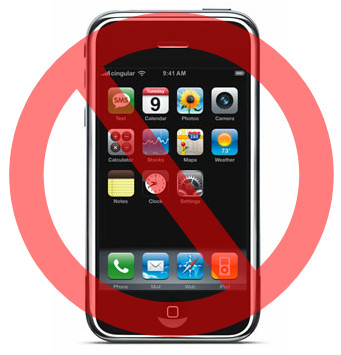Google, Just Say No to iPhone


Google's current development strategy of producing Web-based HTML5 cross-platform applications simply enables Apple to continue to act in a predatory manner with iPhone.
The other day one of our Talkbackers accused me of "complaining about Apple every week".
To paraphrase the late, great Johnny Carson when referring to his constant ribbing of former Vice President Dan Quayle during his opening monologues on the Tonight Show, I'd like to thank the company for giving me so much good material from which to work from.
Heyoooooooooooooooooooooooooo!
Click on the "Read the rest of this entry link" below for more
Now that we've confused our Millennials this morning with my usual historical anachronisms, let's get down to brass tacks.
In a previous piece I've discussed Google's current HTML5/Webkit development strategy and why it is a good technology standard for cross-platform application development for vertical-market applications for mobile devices.
I've now come to the conclusion that while HTML5/Webkit may be good for the industry at large, it may not be such a good idea for Google, at least while Apple is rattling sabers and firing rockets at its neighbors and Google's friends.
HTC, one of the largest contract electronics manufacturers in Asia, has partnered with Google as an OEM to manufacture and design Android-based smartphones for several wireless carriers including Google's own Nexus One which currently operates on the T-Mobile network in the United States and is expected to be coming shortly to Verizon.
I've said this in the past, but I'm going to say it again. Google, go tell Apple to go Shove It.
When I wrote the previous article a year ago, Google was still coding native applications for iPhone. Shortly after, it moved to an HTML5/Webkit development model that allowed any smartphone which used a Webkit-based browser to use Google's services as mobile web applications that appeared near-native. Currently Google uses HTML5 to present GMail, Google Buzz, Google Voice, Google Search and Google Maps to the iPhone's Mobile Safari browser, as well as native API capability for 3rd party iPhone apps that want to hook into their services.
The benefit of coding to HTML5 for Google was obvious -- build web-based mobile apps that would be able to run on all modern smartphone browsers that embraced Webkit and HTML5 standards.
Right now the primary userbase of Google's HTML5 apps is iPhone, but they also function on Android, which has a HTML5/Webkit based browser. Android, however, also has the benefit of native Google applications.
Google has also produced a native search and calendar/contacts sync suite for BlackBerry, in addition to a native Java Blackberry GMail client, but it is expected that when RIM finally releases its own Webkit/HTML5 browser, Google will probably devote most of its smartphone/mobile efforts for platforms other than Android to Webkit/HTML5 web apps.
I've now come to the conclusion that this is no longer a good idea.
As long as Apple continues to act in a predatory manner and threaten Android manufacturers -- and probably eventually Google itself with litigation over UI patents, then Google needs to cease all of its HTML5/Webkit development. And when I mean ALL, I mean ALL.
While Apple is litigating Android manufacturers and "Doing Evil" -- and engaging in activity that conflicts with Google's core values, Apple and iPhone/iPad will become the pariah state and pariah products of the smartphone and mobile device ecosystem. Apple's iJuche policies are now going too far and are extending to threaten other neighbors who are peacefully operating and competing within the capitalist ecosystem.
Self-imposed isolation from the rest of the industry is one thing, and clearly Apple's has made its choice to embrace an ideology of NIH and wall itself off from other standards, such as Adobe's Flash and Adobe Digital Editions. While I believe this isolationism is stupid and counterproductive, nobody needs to try stop them from doing this -- Apple's products will succeed or fail based on those strategic business decisions. That is how capitalism and fair market competition works.
However, when you are dealing with a rogue nation that wants to bully its neighbors, you do the only thing you can do, which is to impose sanctions and severe penalties until it begins to behave. It's time to give Apple a Time Out.
Google has up to this point honored its policy of "Doing no Evil". For this, I applaud the company. Apple's Steve Jobs may like to call Google's behavior "Bullshit" but I beg to differ.
Litigating Android manufacturers like HTC means that for Google, the gloves must come off. Indeed, much of the usefulness of the iPhone is derived by its ability to leverage Google's services. If that usefulness is hampered by forcing the Mobile Safari browser to use Google's sites and services like any old web browser as opposed to being fully screen and interface-optimized, so be it.
Until Apple behaves I suggest that Google put forth all its mobile efforts on native applications for Android, Blackberry and Wndows 7 Phone and cease the use of Webkit/HTML5. Revoke all its applications from the App Store. Terminate any and all strategic agreements. Make Apple and its developers do the heavy lifting if they want to use their services. Or better yet, force them to negotiate with Microsoft and Yahoo! as the new service provider.
I'm sure Apple's millions of iPhone users will be utterly thrilled about that prospect.
Should Google alter its mobile strategy now that Apple has gone to war with its allies? Talk Back and Let Me Know.
[poll id="5"]